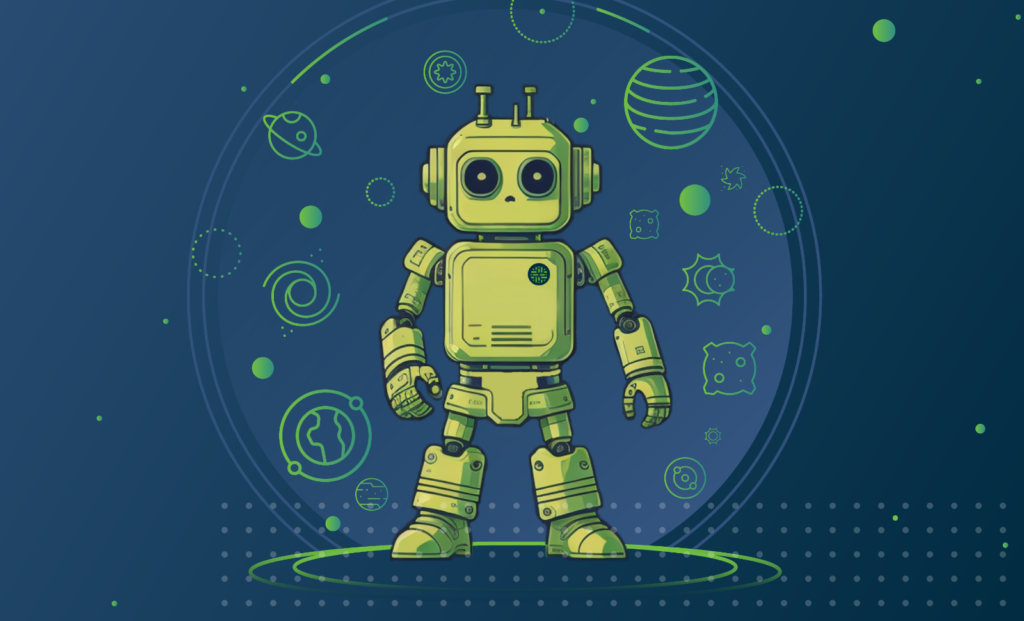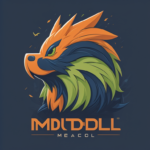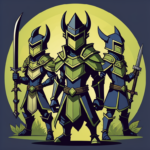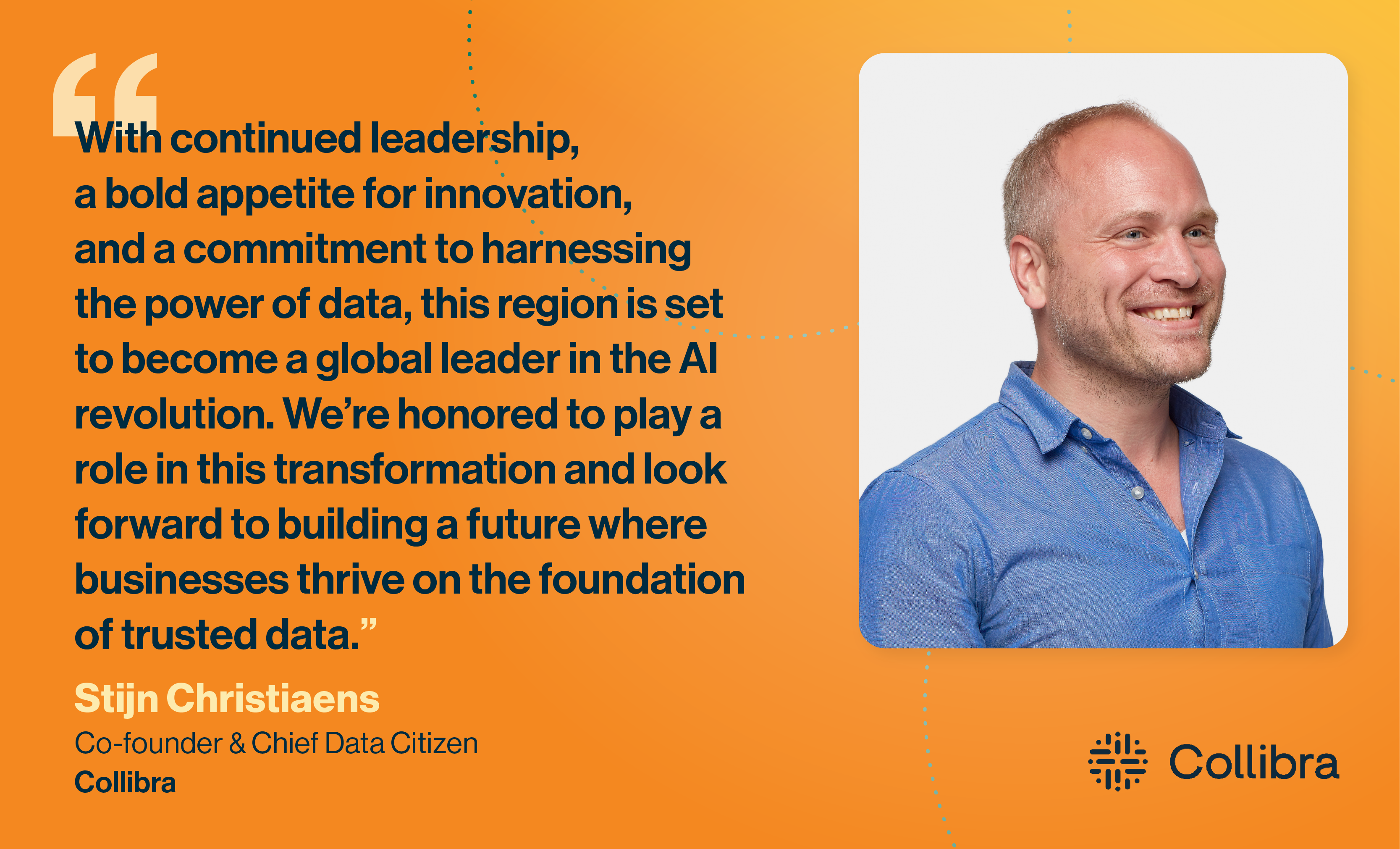As the data intelligence company, we’ve long anticipated broad adoption of AI, and Collibrians with data science and machine learning expertise have been working diligently on ways to apply AI/ML. Disruptive technologies such as ChatGPT, Bard, and other generative AI technologies suddenly made AI accessible to everyone, regardless of their level of data science expertise.
“We are working toward complete organizational empowerment on generative AI, as all Collibrians will play a part in creating our next-generation capabilities.” — Alexandre T’Kint, Generative AI Program Manager
This exciting development means that people closest to the processes, products, and customers can actively participate in bringing AI solutions to life. The Collibrians working on Collibra’s AI strategy knew that great ideas were blooming all around the organization, and they wanted to activate them quickly.
Generative AI Program Manager Alexandre T’Kint shared, “We are working toward complete organizational empowerment on generative AI, as all Collibrians will play a part in creating our next-generation capabilities.”
Alexandre and a cross-functional team decided a hackathon would be a great way to foster ideation and innovation, and they turned to the Large Language Model (LLM) ChatGPT and other generative AI technologies to help plan, communicate, and execute the event in record time.
Many hands and brains turned their ideas into viable prototypes — and Collibrians around the world got valuable, hands-on experience with new, disruptive technologies. We can still feel the excitement buzzing while ideas continue to surface.
How Collibrians used AI to plan an AI hackathon

Senior Learning and Development Manager Jessica Speciale has planned her fair share of hackathons for companies like ServiceNow, Atlassian, and Microsoft. These large, in-person events always required months of planning.
“Normally, when you’re doing a hackathon, you spend months in the pre-planning stage answering questions like: What is the hackathon’s goal? How will you market the hackathon internally and externally? What is the theme and how will you create consistency with the theme? How will you identify and communicate to winners? Etc.,” Jessica shared.
The Collibra team accomplished what would normally take months in a matter of weeks, thanks to generative AI.
The team had a few key decisions made when the project kicked off:
- The event would take place early in the summer.
- It would be open to any Collibrian who wanted to participate — regardless of their technical background
- Participants could participate virtually or in our New York or Brussels offices.
With those requirements in place, the next step was to create a project plan, so the team turned to ChatGPT. With just a few sentences entered as prompts, out came a detailed project plan complete with milestones, a communications plan, and actual content for the communications.
Below are some example prompts the team used to generate communications and other hackathon content:
- Please generate a marketing email for a generative AI hackathon as a second notice.
- What are the judging criteria for this hackathon?
- What are three fun activities we can do to close out our virtual hackathon? Can you build an agenda with three activities for a 20 minute closing call?
- What are some interactive ice breaker questions we could use in a poll format? Please provide 10 examples with options.
AI = Ask an Intern
While generative AI is exciting, its output is rarely perfect. We find it handy to think of AI as “Ask an Intern,” meaning we expect good work but always plan to review AI-generated content before using it. We found the results of our prompts to be about 80% there. With a little redirection and a few tweaks, the content was ready to go.
For example, Jessica shared that the team used ChatGPT to draft an email to Collibrians who they hoped would help judge the hackathon. The first result had all the key points but was too long for an email. She simply asked the AI to shorten the email 40%, and it happily complied.
Jessica learned through the process that sometimes you need to be specific with your prompt. She said some of the first results were more relevant for a manufacturing hackathon than a software hackathon. She fixed this by using phrases like “generative AI hackathon” and “tech industry” in her prompts.
Marketing a hackathon requires numerous communications to multiple audiences. By starting from the solid foundation provided by our eager LLM, the team reduced the time spent drafting these communications from days to minutes.
From idea to prototype in 48 hours
The team kicked off hackathon preparations by hosting three informational sessions for anyone who was interested. The first provided general information about the hackathon goals and format. The second introduced the tech stack participants would have at their disposal, and the third provided some generative AI guardrails.
“It’s just amazing that Collibra gives us the time as a collective of individuals to work on something that can deliver real impact on Collibra’s short and long-term strategy.” — Frederiek Van Hoornick, Sales Engineering Manager
The main event started with a welcome session. Once again, the team used ChatGPT to develop the agenda and create icebreaker prompts. They also used the AI art generator Imagine.art to create a mascot for each team (examples below).
During the hackathon, teams had two days dedicated solely to building a prototype for their idea using tools within a Google Cloud Platform (GCP) environment.
Event organizers created a dedicated Slack channel and designated a few times throughout the event to share progress with others, including a virtual gallery walk using Zoom breakout rooms.
Jessica shared she was pleasantly surprised to see Collibrians connecting organically across all global regions. “People were really engaged on Slack throughout the event, and they could choose what projects to learn more about during the gallery walk based on what piqued their interest.”
Learning, connecting, and making an impact
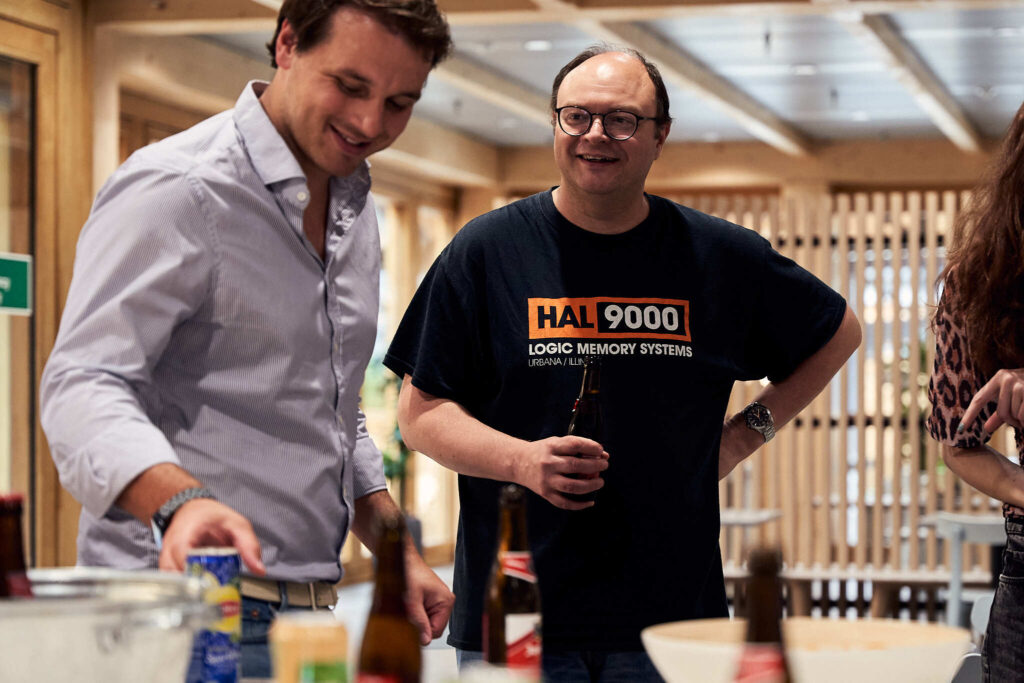
Frederiek Van Hoornick, a Sales Engineering Manager, shared that one thing he enjoyed about the event was the ability to work with new people while learning new skills.
“The hackathon was a great way to create some team feeling across functions and learn about new technology at the same time. It’s just amazing that Collibra gives us the time as a collective of individuals to work on something that can deliver real impact on Collibra’s short and long-term strategy.”
Senior Software Engineer Fadi Khadra shared a similar sentiment about how the event created and strengthened connections with fellow Collibrians.
“Participating in the hackathon was an enriching experience. It was exciting to join forces with people of diverse skill sets to address complex problems. It strengthens the bonds between teammates, and seeing everybody working toward the same goal was super inspiring.”
Across all participants, prior experience with AI ranged from zero to expert. Those with the highest level of expertise served as coaches who were available throughout the event for support.
Coaching was one way event organizers made the event inclusive of all skill sets. Another was pairing non-technical Collibrians with engineers. For example, one idea from a non-technical Collibrian was using AI to check for unconscious bias in performance feedback. They were paired with an engineer to bring the idea to life. Jessica said the event team plans to market this option even more in future hackathons to bring in more people and ideas from across the organization.
The hackathon impact
Beyond the winning prototypes, prizes, and celebrations, the end result of the hackathon was four-fold:
- More than 100 Collibrians leveled up their generative AI skills. They learned how to critically evaluate AI technologies, the basics of generative AI and LLMs, and how to build and deploy vertex models. They can now use those skills in their work and share with their teams.
- Collibrians with a passion for generative AI connected with one another across teams and functions.
- We now have 19 almost production-ready prototypes and dozens more ideas for how to use generative AI within our organization and across our product portfolio.
- We developed a model for rapidly executing an engaging, productive, hybrid hackathon that we plan to continue using and improving as we embrace the future of generative AI.
Embracing the future of generative AI
The future of generative AI is exciting, to say the least. Frederiek summed it up in two words, “Endless possibilities.”
“Generative AI is accessible to everyone today and can be seamlessly integrated into every product. Unleashing its true potential can only be done when combined with the right data.” — Fadi Khadra, Senior Software Engineer
On his key takeaways from the event, Fadi shared, “Generative AI is accessible to everyone today and can be seamlessly integrated into every product. Unleashing its true potential can only be done when combined with the right data. AI will undeniably reinforce the requirement for data governance.”
Ultimately, the future of generative AI and the future of data intelligence are one in the same. Without trusted data, there is no artificial intelligence. That’s why Collibrians are working hard to learn, grow, and continue leading the way for all Data Citizens. If you want to learn more, we recommend reading about AI governance.
We want to give a big thank you to each and every Collibrian who participated in the hackathon, our team of coaches, and our judging panel. And a very special thank you to our fantastic event organizers, Alexandre T’Kint, Jessica Speciale, Courtney Luke, Birgit Van Diest, and Eric Warner.
